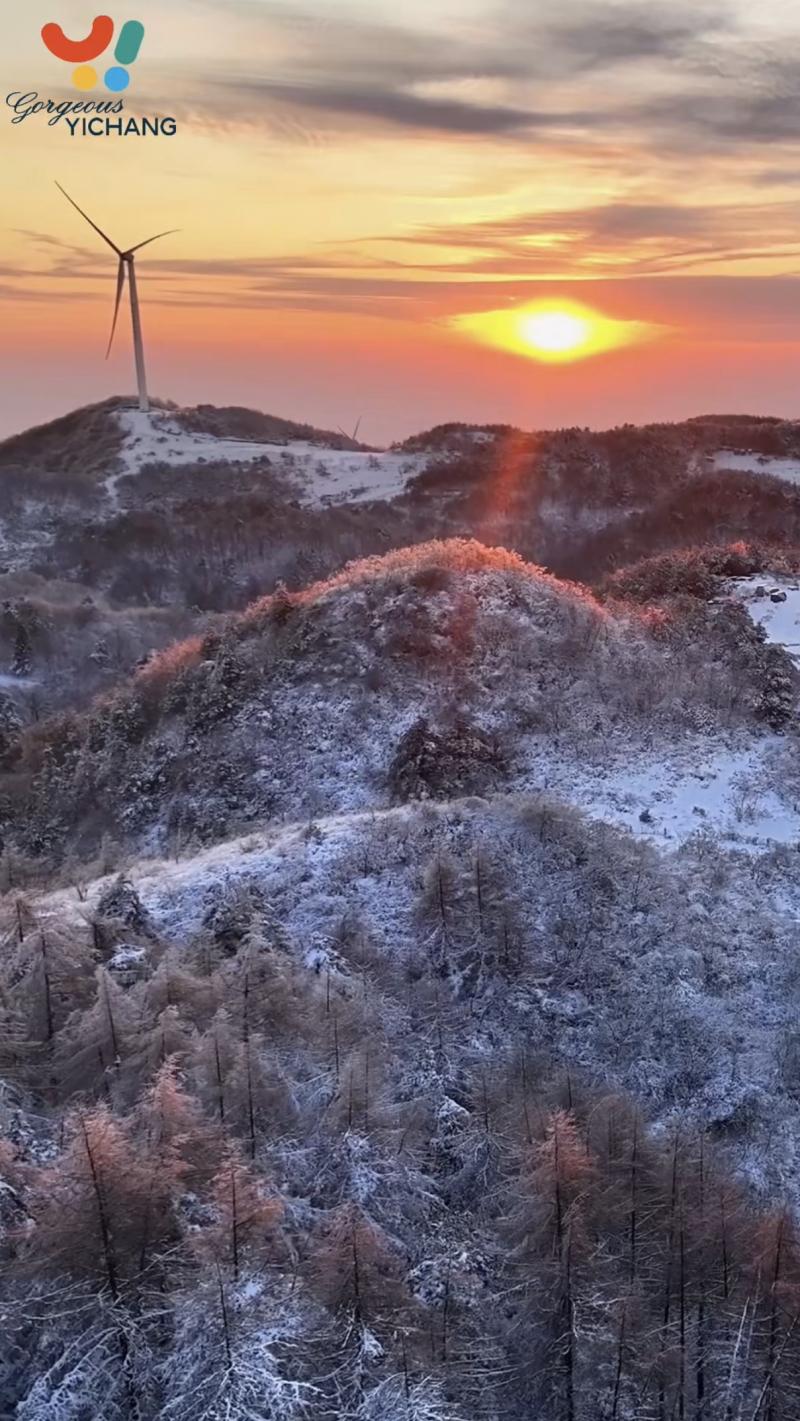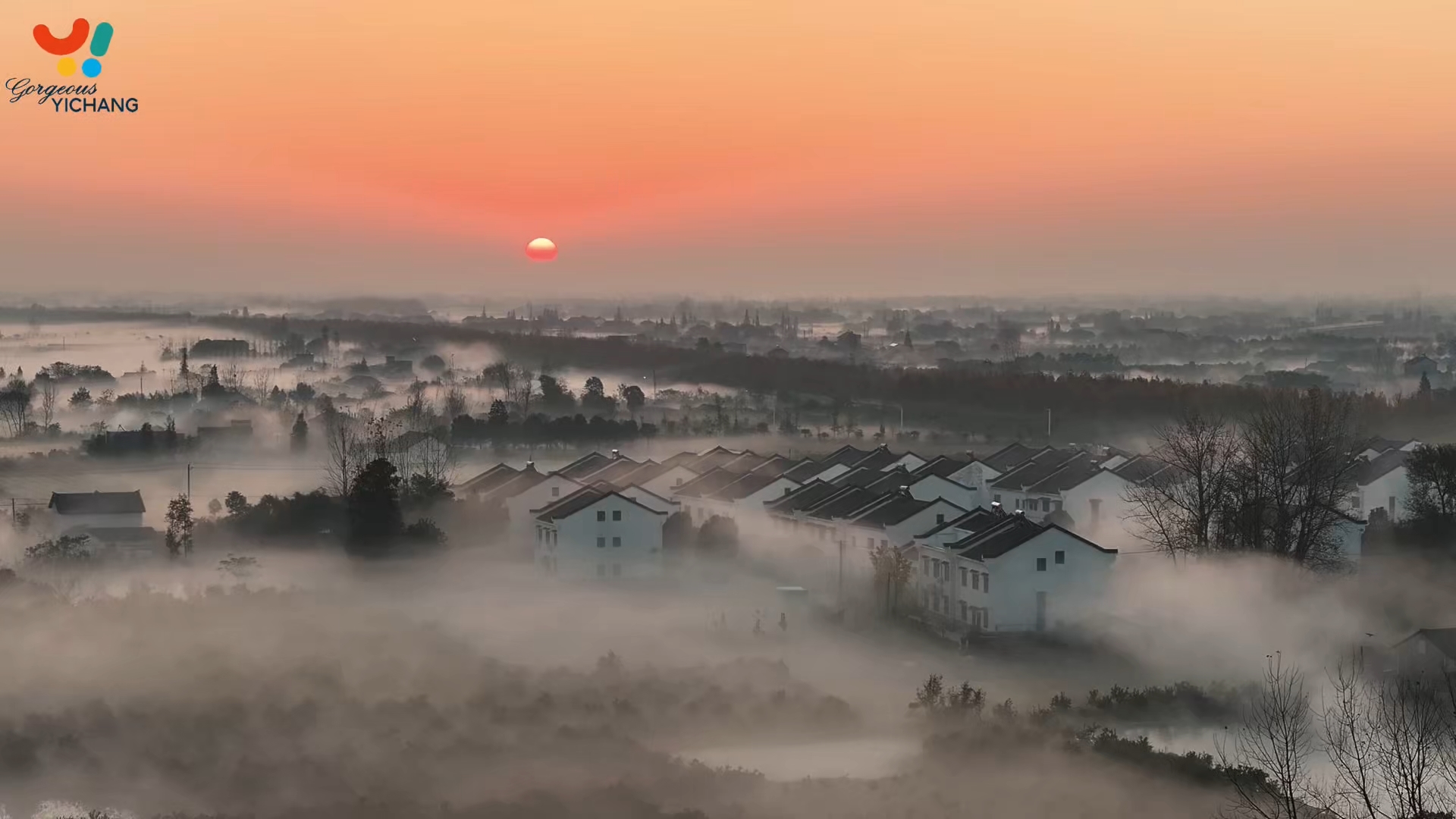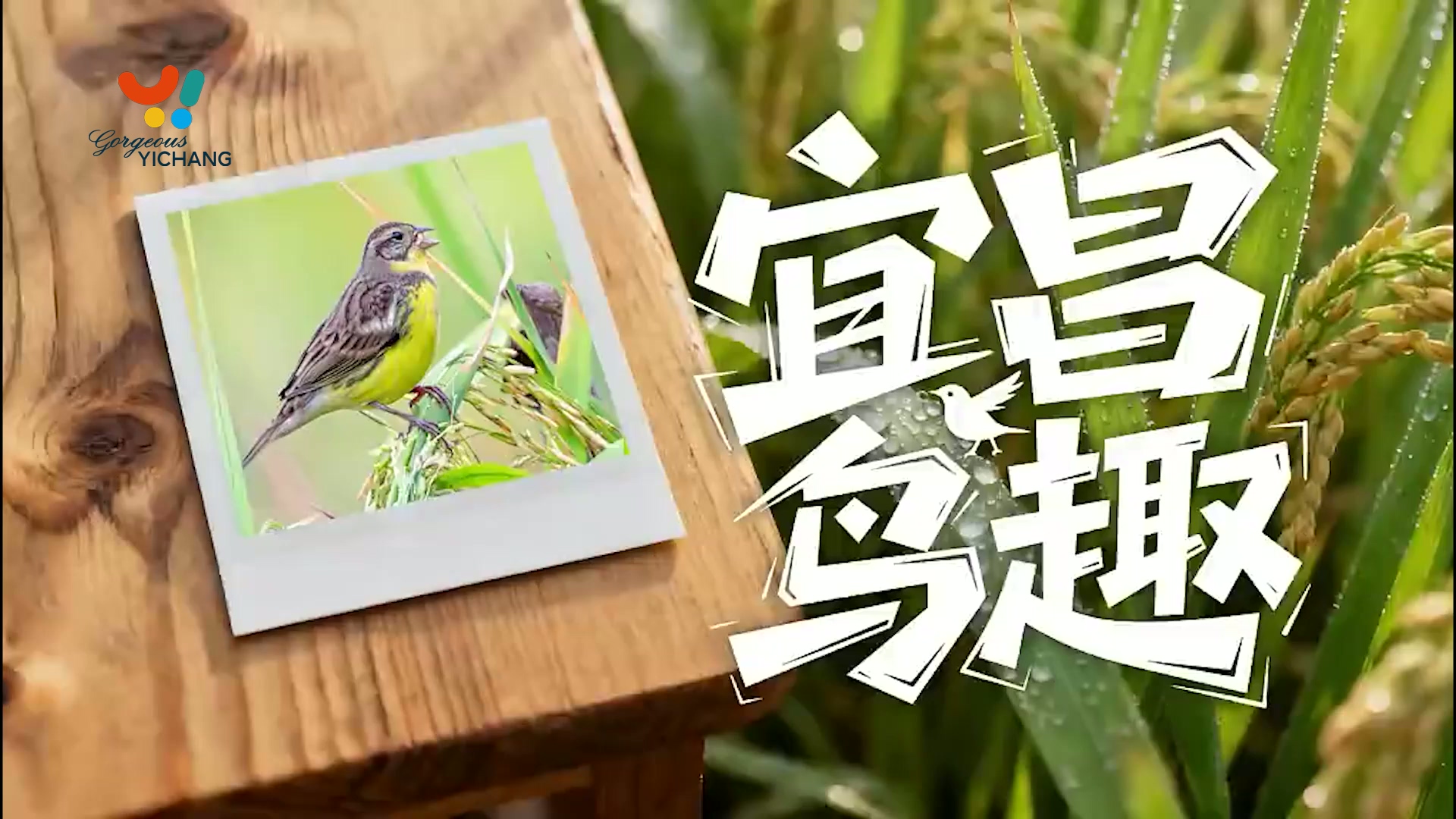Yichang on mission to clean up Yangtze River
2023-03-16 18:03:12
By YUAN SHENGGAO | China Daily | Updated: 2023-03-09 00:00
Reducing pollution
Over the past five years, Yichang has made notable achievements in managing wastewater outlets, reducing pollution by ships and repairing the ecosystems along the Yangtze, among other aspects.
"The quality of water in the Yichang section of the Yangtze River satisfies Grade II standards (the second best level in China's five-tier water quality system)," said Ma Ze, a deputy to the National People's Congress and the mayor of Yichang.
"The total phosphorus concentration contained in the water leaving Yichang has decreased by 57 percent compared with that in 2017.
"The number of days with good air quality has reached 311, an increase of 53 days over 2017," Ma noted.
As of October, Yichang had finished the on-site investigation, monitoring, tracing and naming of 1,973 wastewater outlets along the Yangtze River and Qingjiang River basins, and had renovated 1,677 of them, according to the local Sanxia Daily newspaper.
The Qingjiang River, spanning 423 kilometers, is a tributary of the Yangtze.
Pollution prevention and water treatment infrastructure are critical to repairing the ecosystems of the Yangtze River basin. As of November, as reported by Sanxia Daily, 492 classified garbage bins and 164 oily wastewater storage tanks had been installed across 82 docks in Yichang.
Sixteen facilities for separating sewage from rainwater had also been built. All bulk cargoes at ports were shielded by dustproof covers and windbreak netting, according to the news report.
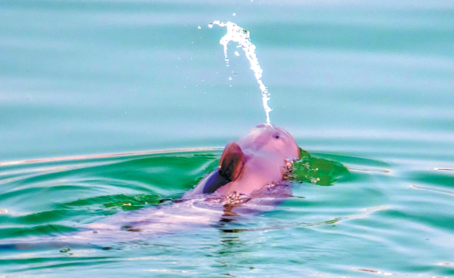
Greening industry
Yichang boasts a thriving shipping industry. As ship pollution control measures get stricter in China, the city is contributing to the green growth of the industry by optimizing ship designs and adopting clean energy, among other measures.
In 2022, Yichang built 125 ships with a gross tonnage of 360,000 metric tons, accounting for more than half of Hubei's total. Among the vessels, 28 are powered by new energy, accounting for 56 percent of the total new energy ships built in the province.
Yichang has set up a task force to renovate shore-to-ship power facilities on ships. Sixteen ships were renovated in 2020, 76 in 2021 and 207 in 2022.
Assuming that each of those ships used a 40-kilowatt diesel generator for 10 hours on average every day before the renovation, the 299 ships can now reduce their collective fuel consumption by 9,269 tons and carbon dioxide emissions by 27,807 tons annually.
"Yichang has moved from preventing and managing tangible shipping pollution, such as garbage, domestic sewage and oily wastewater, to controlling colorless, odorless and intangible carbon emissions," said Huang Hong, deputy director of the Yichang port construction and maintenance center.
With abundant phosphate ore resources, Yichang has developed a strong chemical industry. In recent years, Yichang has pushed forward the reform and relocation of chemical enterprises and has released more than 20 documents, such as the Yichang Chemical Industry Green Development Plan (2017-25), in a bid to direct the industry toward a high-end, refined and sustainable growth path.
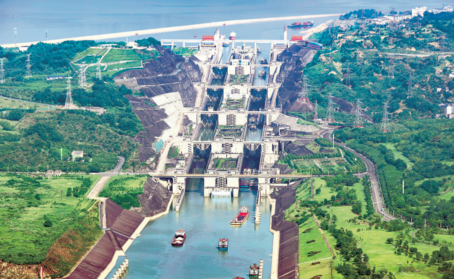
Raising awareness
In addition to heavy industry, Yichang has been making efforts to raise environmental awareness throughout communities.
From this year onward, the city will celebrate the Yichang Yangtze River Protection Day on April 24.
Wang Yunguo, a resident of Sandouping town in Yichang's Yiling district, has built a laundry sink next to his house. The laundry wastewater flows into a septic tank on the side, Sanxia Daily reported in November.
Previously, the family of five did their laundry in the stream in front of their house. Wang decided to build the sink after his granddaughter, a middle-school student, told him that the phosphate in the laundry detergent would pollute the water.
Zhang Jianhua, head of Yiling's education authority, said the district has been exploring methods to raise environmental awareness among residents. Stepping up environmental education for schoolchildren is seen as one of them.
In 2017, Yiling district compiled a reader titled Little Champions of Environmental Protection and launched compulsory courses on ecology for local primary school, secondary school and kindergarten students, according to Sanxia Daily.
They are also taught to recycle and sort garbage, and live a green lifestyle.
The students, in turn, can pass the knowledge on to their parents, grandparents and other family members, which will drive environmental protection across the wider community, said Sanxia Daily.
For businesses in Yiling, the local government is urging them to fulfill their environmental duties in production processes, production techniques and other aspects of business.
A group of local companies, such as Hubei Hongyu New Packaging Materials and Xianglin Science and Technology, have been named as bases for environmental education due to their exemplary green practices, according to Sanxia Daily.
The city of Yichang, which is located in the central province of Hubei and the middle reaches of the Yangtze River, has made marked progress in curbing pollution, cleaning up heavy industry and raising environmental awareness as it strives to become an exemplar of protecting the nation's mother river.
The latest survey shows that the number of Yangtze finless porpoises, or jiangtun in Chinese, living in the Yichang section of the Yangtze has grown to 23, up from five in 2015, according to a local official.
The critically endangered freshwater dolphin species, known as the "giant panda of the water", is seen as a barometer of the ecological condition of the Yangtze River basin.
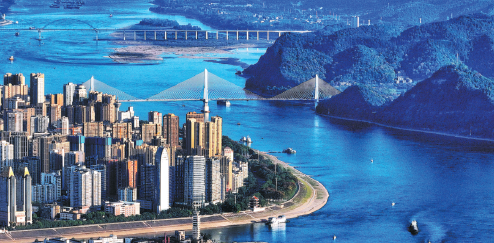
The latest survey shows that the number of Yangtze finless porpoises, or jiangtun in Chinese, living in the Yichang section of the Yangtze has grown to 23, up from five in 2015, according to a local official.
The critically endangered freshwater dolphin species, known as the "giant panda of the water", is seen as a barometer of the ecological condition of the Yangtze River basin.

An aerial picture of Yichang city in Hubei province. ZHOU XINGLIANG/FOR CHINA DAILY
Reducing pollution
Over the past five years, Yichang has made notable achievements in managing wastewater outlets, reducing pollution by ships and repairing the ecosystems along the Yangtze, among other aspects.
"The quality of water in the Yichang section of the Yangtze River satisfies Grade II standards (the second best level in China's five-tier water quality system)," said Ma Ze, a deputy to the National People's Congress and the mayor of Yichang.
"The total phosphorus concentration contained in the water leaving Yichang has decreased by 57 percent compared with that in 2017.
"The number of days with good air quality has reached 311, an increase of 53 days over 2017," Ma noted.
As of October, Yichang had finished the on-site investigation, monitoring, tracing and naming of 1,973 wastewater outlets along the Yangtze River and Qingjiang River basins, and had renovated 1,677 of them, according to the local Sanxia Daily newspaper.
The Qingjiang River, spanning 423 kilometers, is a tributary of the Yangtze.
Pollution prevention and water treatment infrastructure are critical to repairing the ecosystems of the Yangtze River basin. As of November, as reported by Sanxia Daily, 492 classified garbage bins and 164 oily wastewater storage tanks had been installed across 82 docks in Yichang.
Sixteen facilities for separating sewage from rainwater had also been built. All bulk cargoes at ports were shielded by dustproof covers and windbreak netting, according to the news report.

A finless porpoise in the Yangtze River. YANG HE/FOR CHINA DAILY
Greening industry
Yichang boasts a thriving shipping industry. As ship pollution control measures get stricter in China, the city is contributing to the green growth of the industry by optimizing ship designs and adopting clean energy, among other measures.
In 2022, Yichang built 125 ships with a gross tonnage of 360,000 metric tons, accounting for more than half of Hubei's total. Among the vessels, 28 are powered by new energy, accounting for 56 percent of the total new energy ships built in the province.
Yichang has set up a task force to renovate shore-to-ship power facilities on ships. Sixteen ships were renovated in 2020, 76 in 2021 and 207 in 2022.
Assuming that each of those ships used a 40-kilowatt diesel generator for 10 hours on average every day before the renovation, the 299 ships can now reduce their collective fuel consumption by 9,269 tons and carbon dioxide emissions by 27,807 tons annually.
"Yichang has moved from preventing and managing tangible shipping pollution, such as garbage, domestic sewage and oily wastewater, to controlling colorless, odorless and intangible carbon emissions," said Huang Hong, deputy director of the Yichang port construction and maintenance center.
With abundant phosphate ore resources, Yichang has developed a strong chemical industry. In recent years, Yichang has pushed forward the reform and relocation of chemical enterprises and has released more than 20 documents, such as the Yichang Chemical Industry Green Development Plan (2017-25), in a bid to direct the industry toward a high-end, refined and sustainable growth path.

Boats travel through the Three Gorges navigation lock. WANG AIPING/XINHUA
Raising awareness
In addition to heavy industry, Yichang has been making efforts to raise environmental awareness throughout communities.
From this year onward, the city will celebrate the Yichang Yangtze River Protection Day on April 24.
Wang Yunguo, a resident of Sandouping town in Yichang's Yiling district, has built a laundry sink next to his house. The laundry wastewater flows into a septic tank on the side, Sanxia Daily reported in November.
Previously, the family of five did their laundry in the stream in front of their house. Wang decided to build the sink after his granddaughter, a middle-school student, told him that the phosphate in the laundry detergent would pollute the water.
Zhang Jianhua, head of Yiling's education authority, said the district has been exploring methods to raise environmental awareness among residents. Stepping up environmental education for schoolchildren is seen as one of them.
In 2017, Yiling district compiled a reader titled Little Champions of Environmental Protection and launched compulsory courses on ecology for local primary school, secondary school and kindergarten students, according to Sanxia Daily.
They are also taught to recycle and sort garbage, and live a green lifestyle.
The students, in turn, can pass the knowledge on to their parents, grandparents and other family members, which will drive environmental protection across the wider community, said Sanxia Daily.
For businesses in Yiling, the local government is urging them to fulfill their environmental duties in production processes, production techniques and other aspects of business.
A group of local companies, such as Hubei Hongyu New Packaging Materials and Xianglin Science and Technology, have been named as bases for environmental education due to their exemplary green practices, according to Sanxia Daily.

